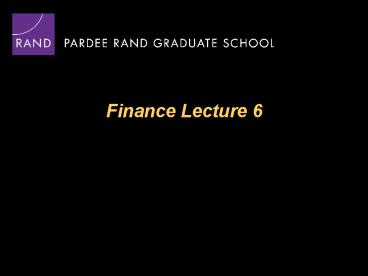Finance Lecture 6 PowerPoint PPT Presentation
1 / 17
Title: Finance Lecture 6
1
Finance Lecture 6
2
Outline Lecture 6
- NPVs Tempting Cousin, IRR
- Assorted Insights on Capital Budgeting
3
The Internal Rate Of Return IsThe Interest Rate
At Which PV 0
4
Or, More Formally, SolveFor IRR In This Equation
Can be hard to solve by hand, but easy for a
computer to solve numerically
5
Typically, NPV And IRR AnalysesWill Give The
Same Answer
- If NPV of a prospective project is positive, do
it - If prospective projects IRR is greater than
firms cost of capital (e.g., interest rate), do
it - For many scenarios, NPV and IRR analyses agree
with one another - Plus IRR additionally provides information on
how high interest rates can be with a project
remaining desirable - Unfortunately, there are certain pathological
cases where IRR gives the wrong answer
6
IRR And NPV Can ConflictOn Mutually Exclusive
Projects
Project A Spend 1 now, get 2 next
year Project B Spend 1000 now, get 1500 next
year
7
IRR Likes Small, High Rate Projects
IRR(A)100 IRR(B)50 But if i15, NPV(A)
0.74 NPV(B)304.35
8
Primarily Use NPV In Decisionmaking
- NPV is contribution to shareholder wealth
- IRR falsely assumes unused capital
- (in small/large case) is reinvested at IRR
- IRR-based decisionmaking is OK if
- projects are independent (e.g., both A and
- B are good projects if you can do both)
- IRR does give intuition on safety margin
9
Outline Lecture 6
- NPVs Tempting Cousin, IRR
- Assorted Insights on Capital Budgeting
10
Mutually Exclusive Projects With UnequalLengths
Pose An Analytical Challenge
- NPV alone may be insufficient
- What will happen when shorter project
- ends?
- Two techniques Replacement Chain,
- Equivalent Annuity
11
Replacement Chain Assumes YouReplace Each
Project With Copy
- To compare 3 year versus 5 year project,
- compare five 3 years to three 5 years -
- Artificially lengthy chain
- Build as many cases as needed to get
- equal length (e.g., 3 year versus 4 year
- requires 12 year chain)
12
Replacement Chain ExampleNPV Is Not Enough
Project A -100/70/70
i10 Project B -100/50/50/50 NPV(A)21.49,
NPV(B)24.34 Project A six year
chain -100/70/-30/70/-30/70/70 NPV(ARC)53.92 Pr
oject B six year chain -100/50/50/-50/50/50/50 NP
V(BRC)42.63
13
Equivalent Annuity TranslatesUneven Flows Into
One Annual Value
14
Replacement Chains And EquivalentAnnuity Will
Give Same Results
- Methods are symmetric
- Both make assumptions you may not
- like!
- Most notably, both assume static technology
- Shorter projects may be better (worse)
- than calculated if alternatives are better
- (worse) in the future
15
With Capital Rationing,Capital Budget Is Capped
- Cap may be below computed optimum
- budget
- Risk-averse management? Worries
- about excess optimism?
- Shareholder value is not maximized
- if NPVgt0 projects are ignored
16
Capital Rationing Creates AConstrained
Maximization Problem
- Choose projects with greatest NPVs
- SUBJECT TO capital constraint
- Tends to favor small, short, high IRR
- projects
- Firm likely to eschew long-term
- investments
- Government entities often act this way
17
(No Transcript)

